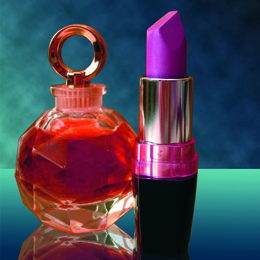
You see what appears to be your favorite brand name eye shadow, eye liner, or fragrance for sale at a flea market or on an unfamiliar website. You notice the price is lower than what you normally pay at your favorite retail store or through an authorized online dealer.
Before you hand over your hard-earned money, keep this in mind:
It could be counterfeit, and in addition to buying something that’s not the real deal, consumers are also risking their health by buying and using products that may contain substandard or even dangerous substances.
The National Intellectual Property Rights (IPR) Center of which the FBI is a partner wants you to know that the volume of all sorts of counterfeit cosmetics and fragrances coming into the U.S. is definitely on the rise…that’s according to our industry partners as well as law enforcement. Why is this happening? Because the Internet has given counterfeiters widespread access to customers, and because criminals increasingly view dealing in counterfeit personal care products as well as other knock-off consumer goods a relatively low-risk crime since many of the perpetrators are located outside of the U.S.
Government and industry studies and testing have discovered that some of the ingredients that make up counterfeit cosmetics and fragrances are downright dangerous:
- Phony cosmetics often contain things such as arsenic, beryllium, and cadmium (all known carcinogens) along with high levels of aluminum and dangerous levels of bacteria. Some of these products have caused conditions like acne, psoriasis, rashes, and eye infections that could lead to blindness.
- Counterfeit fragrances have been found to contain something called DEHP, classified by the Environmental Protection Agency as a probable human carcinogen. These phony perfumes and colognes, which often contain urine, have been known to cause serious skin rashes.
Indicators of Counterfeits:
|
|---|
There is no typical profile of the individual(s) or groups trafficking in these kinds of counterfeit product, however groups from India have been known to traffic these types of products, and this might just be one of their many illegal activities, often times, the illicit proceeds are used to fund other types of crime. The National IPR Center says they have also seen people selling counterfeit products through online auction sites such as Ebay and other websites just to make a little extra cash, some may not even realize their merchandise is fake.
New York, Bahamas, and Florida are just three of the areas that are hit the hardest by illegal counterfeit merchandise, although the illegal activity is not limited to these three areas.
Because of the dangers to the public, law enforcement is mobilizing against counterfeit cosmetics and fragrances. For example, the nearly two dozen U.S. and foreign agencies that make up the National IPR Center are working on the matter sharing intelligence with one another, coordinating with state and local law enforcement, and developing relationships with industry representatives.
The FBI and the National IPR Center need the public’s help.
First, educate yourself about some of the common indicators of counterfeit cosmetics and fragrances so that you don’t become a victim. If you’re not sure about the authenticity of a product, don’t buy it.
And second, if you think you or someone you know may have purchased counterfeit cosmetics or fragrances or if you suspect someone of selling counterfeit items, submit a tip to the National IPR Center. The more information law enforcement has, the more effective we can be. With the proliferation of counterfeit goods increasing at an alarming rate, the National IPR Center focuses on keeping these bogus and often unsafe products off U.S. streets while dismantling the criminal organizations behind this activity.
